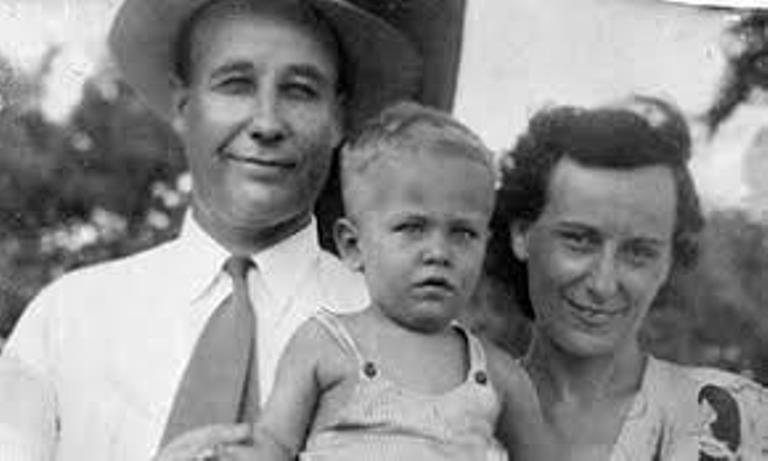|
Father’s Day is here; a good book is always in order. I just read a lovely book, not exactly a greeting-card image of a father or a mother, but better yet, Richard Ford’s “Between Them: Remembering My Parents,” exploring what he can remember and what he can only surmise about Parker and Edna Ford. Any book by this Pulitzer-Prize-winning author is always welcome. He came to them late, a surprise only child after more than a decade of marriage. He tries to reconstruct what it must have been like for them to become parents. “Between Them” refers to what their life was like before him; and also how his needs, as infant and boy, inevitably placed him in the middle. They accepted the responsibility like adults -- two people from the rural south with modest schooling and an ethic of doing their best. His father was a traveling salesman, out Monday morning, home Friday evening. The son cannot remember much conversation with his father, just his earnest presence; he has no complaints. His mother was more lively, more layered, with more family support. After the father died, Richard Ford was able to say “I love you” to his mother, ask about her life as a widow. She grew, found a job she loved, remained independent virtually to the end; he salutes her. The backdrop – maybe even the real subject of the book -- is the back part of America that suffered terribly in the Depression. Yet his father always had work. Ford says he never heard his parents talk of the racial divide that must have been obvious in their geographically-central chosen home of Jackson, Miss. They lived in a country that had two – then three – citizens. The family. He remembers, he reconstructs, he imagines, the hopes and dreams of two people who did not complain; he notes the family stresses both brought to the marriage. The book includes several snapshots of a salesman and his wife with a car, hats and suits and dresses, their final suburban home, their post-war dream, fulfilled by a salesman with a failing heart. The dead-serious faces of these Americans – long before the plague of selfies, everybody a star of their own reality show -- reminds me of the collaboration between writer James Agee and photographer Walker Evans, “Let Us Now Praise Famous Men.” They caught the bravery and dignity of rural America, and so does Richard Ford. Near the end, Ford notes that he and his wife do not have children. He admits he can only guess what it is like to be a father, a parent. His parents did their best. What a lovely thing to be able to say. * * * Richard Ford’s book reminds me of Samuel Barber's haunting "Knoxville 1915,” based on Agee's memories of a hot evening at home, when he was a boy. As with Ford, death lurks over the slow, sweet gathering as Agee recalls who is present. It ends: “One is my mother who is good to me. One is my father who is good to me.” The older I get, the more I realize how my father and mother, in their own ways, were good to me. Set to Barber’s music, Agee’s words never fail to make me mist up. Richard Ford’s memories touched me the same way. His mother and his father were good to him. * * * (As a companion to Richard Ford’s touching new book, may I suggest listening to the Eleanor Steber 1948 Carnegie Hall performance of “Knoxville 1915,” including the piano accompaniment by Edwin Biltcliffe.)
Laura
6/15/2017 06:00:40 pm
Funny. I just bought Sherman Alexie's new memoir about his mother. I'm a sucker for great fiction writers writing memoirs.
Altenir Silva
6/15/2017 07:10:03 pm
Dear George,
George Vecsey
6/15/2017 10:16:48 pm
Dear Altenir: How sweet. You were beaming when you and Celia and Neo were in NYC recently. What a fascinating concept from your parents. Have you written about their lives and wisdom? Your next project. My best to you all on Father's Day. George
Brian Savin
6/15/2017 10:01:34 pm
Well, I guess the good news, George, is that we got to be old enough to see our kids grow up through many Fathers Days unlike Ford and Agee's Dads. The not as good news is that in hanging around so long the kids get to know us well and ao won't likely romanticize us and write or commission great artistic works about us. Recently an older friend and I were talking about our eventual demise. He mentioned it likely I would outlive him. I snapped back, "I hope not, Doug. I'm relying on you to come to my funeral. You're the only one I can depend on to tell the folks who come that I wasn't the miserable sonofabitch they all think I am." Happy Father's Day.
George Vecsey
6/15/2017 10:19:41 pm
Brian: Yes, we all need to find somebody to stick up for us. 6/18/2017 03:44:28 pm
Brian
George Vecsey
6/18/2017 05:50:46 pm
Alan, Josh and Jen are wise to take notes, tapes, mental memories. Comments are closed.
|
Categories
All
|










